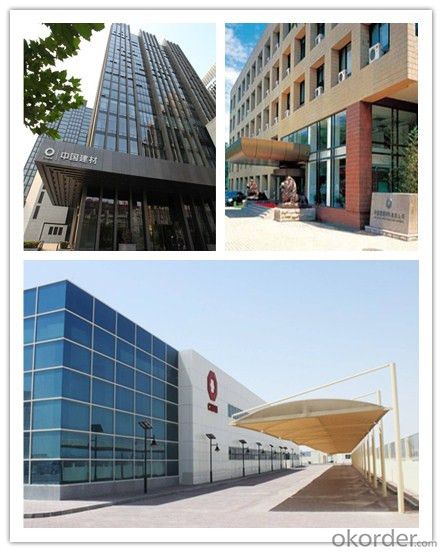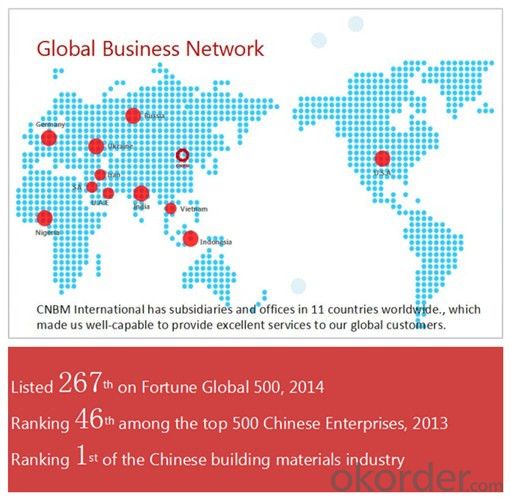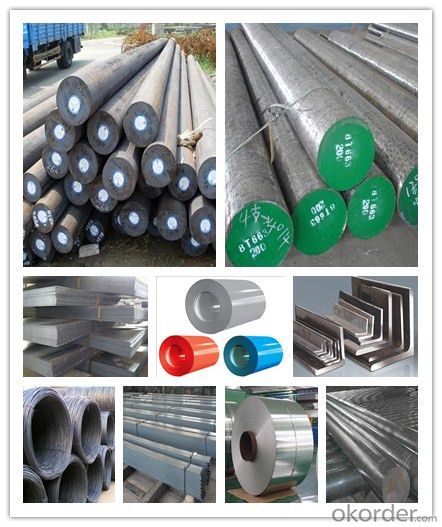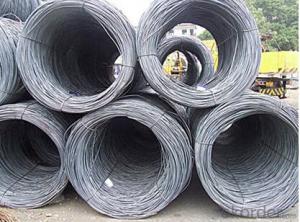SWRH42A 42B 57A Galvanized Steel Wire Rod
- Loading Port:
- Tianjin
- Payment Terms:
- TT OR LC
- Min Order Qty:
- 10 m.t.
- Supply Capability:
- 10000 m.t./month
OKorder Service Pledge
OKorder Financial Service
You Might Also Like
Item specifice
SWRH42A 42B 57A Galvanized Steel Wire Rod
Details of the SWRH42A 42B 57A Galvanized Steel Wire Rod
| Steel Grade | Q195-Q235,Q235,SAE 1008-1018 Hot Rolled Steel Wire Rod |
| Diameter | 5.5, 6.5, 7,8, 9,10, 12,14mm.etc. |
| Coil weight | 2m.t. |
| Application | drawing, construction materials, machinery parts,construction for Houses, Bridges, Roads,Packing |
| Deliver Time | 25-30 days after receipt of L/C or deposit by T/T |
| Packing | In coils, loading in container or by bulk vessel |
| Payment terms | 1).100% irrevocable L/C at sight. |
| 2).30% T/T prepaid and the balance against the copy of B/L. | |
| 3).30% T/T prepaid and the balance against L/C |
| Chemical Composition(%) | ||||||
| C | Mn | Si | S | P | Cr | |
| SAE1006B | 0.03~O.07 | ≤0.32 | ≤0.30 | ≤0.045 | ≤0.040 | 0.3-0.35 |
| Mechanical properties | ||||||
| Yield strength(N/mm2) | Tensile strength(N/mm2) | Elongation(%) | ||||
| 250-280 | 350-380 | ≥32 | ||||
| Grade | Chemical Composition(%) | |||||
| C | Mn | Si | S | P | Cr | |
| SAE1008B | 0.10max | 0.3~O.50 | 0.15max | 0.050max | 0.040 max | 0.3-0.35 |
| Mechanical properties | ||||||
| Yield strength(N/mm2) | Tensile strength(N/mm2) | Elongation(%) | ||||
| ≥195 | 315-430 | ≥30 | ||||
Supplier of the SWRH42A 42B 57A Galvanized Steel Wire
CNBM International Corporation is the most import and export platform of CNBM group(China National Building Material Group Corporation) ,which is a state-owned enterprise, ranked in 270th of Fortune Global 500 in 2015.
With its advantages, CNBM International are mainly concentrate on Cement, Glass, Iron and Steel, Ceramics industries and devotes herself for supplying high quality series of refractories as well as technical consultancies and logistics solution.


Delivery of the SWRH42A 42B 57A Galvanized Steel Wire Rod
Packaging Detail | Sea worthy packing /as per customer's packing instruction |
Delivery Detail | 15 ~ 40 days after receiving the deposit |
Products Show

FAQ:
Are you a trading company or manufacturer? | Manufacturer |
What’s the MOQ? | 3 metric ton |
What’s your delivery time? | 15-35 days after downpayment received |
Do you Accept OEM service? | Yes |
what’s your delivery terms? | FOB/CFR/CIF |
What's the Payment Terms? | 30% as deposit,70% before shipment by T/T |
Western Union acceptable for small amount. | |
L/C acceptable for large amount. | |
Scrow ,Paybal,Alipay are also ok | |
Why choose us? | Chose happens because of quality, then price, We can give you both. Additionally, we can also offer professional products inquiry, products knowledge train (for agents), smooth goods delivery, excellent customer solution proposals. |
What's your available port of Shipment? | Main Port, China |
What’s your featured services? | Our service formula: good quality+ good price+ good service=customer's trust
|
Where are your Market? | Covering more than 160 countries in the world |
- Q:What are the main characteristics of creep-resistant steel forgings?
- Creep-resistant steel forgings have several key characteristics. They possess excellent resistance to high temperatures and are capable of withstanding prolonged exposure to elevated temperatures without undergoing significant deformation. These forgings also exhibit superior strength, toughness, and resistance to corrosion and oxidation. Additionally, they have low thermal expansion and good dimensional stability, ensuring their structural integrity remains intact even under extreme conditions. Overall, creep-resistant steel forgings are specifically designed to maintain their mechanical properties and structural integrity under long-term, high-temperature applications.
- Q:What are the main elements in special steel alloys?
- The main elements in special steel alloys can vary depending on the specific type of alloy and its intended application. However, there are several common elements that are often present in special steel alloys. These include: 1. Iron (Fe): Iron is the main component of steel alloys, providing its base strength and durability. 2. Carbon (C): Carbon is a key element in steel alloys, as it significantly influences the hardness and strength of the material. Different levels of carbon content can result in varying properties, such as high carbon steel for increased hardness or low carbon steel for improved ductility. 3. Chromium (Cr): Chromium is commonly added to steel alloys to enhance their corrosion resistance. It forms a protective layer on the surface of the alloy, preventing oxidation and rusting. 4. Nickel (Ni): Nickel is often used in special steel alloys to improve their resistance to heat and corrosion. It also contributes to enhancing the material's strength and toughness. 5. Manganese (Mn): Manganese is commonly added to steel alloys to improve their workability and machinability. It also enhances the material's strength and impact resistance. 6. Molybdenum (Mo): Molybdenum is frequently included in special steel alloys to increase their strength, hardness, and high-temperature resistance. It also improves the alloy's ability to withstand corrosion. 7. Vanadium (V): Vanadium is often added to steel alloys to enhance their strength, toughness, and heat resistance. It also aids in refining the grain structure of the alloy, resulting in improved performance. These are just a few examples of the main elements commonly found in special steel alloys. Depending on the specific requirements and desired properties, other elements such as tungsten, cobalt, copper, and titanium may also be present in varying amounts. The combination of these elements in different proportions allows for the creation of specialized steel alloys with unique properties tailored for specific applications in industries such as aerospace, automotive, construction, and manufacturing.
- Q:Is special steel suitable for manufacturing firearms?
- Yes, special steel is highly suitable for manufacturing firearms. Special steel alloys are specifically designed to possess exceptional properties such as high strength, hardness, and resistance to wear and corrosion. These characteristics are crucial for firearms as they need to withstand high pressures, recoil forces, and intense heat generated during firing. Special steel alloys, such as stainless steel or chrome-molybdenum steel, offer excellent tensile strength, allowing firearms to handle the immense pressure generated by the ignition of gunpowder. Moreover, the hardness of special steel ensures that the critical components, such as barrels and receivers, are durable and can withstand repeated use without deforming or cracking. Firearms also require resistance to wear and corrosion, as they are often exposed to harsh environments and various weather conditions. Special steel alloys are engineered to have superior resistance to both wear and corrosion, ensuring that the firearms remain functional and reliable even after prolonged use or exposure to moisture. Furthermore, special steel alloys can be easily machined and formed into complex shapes, allowing manufacturers to create intricate firearm components with precision. This versatility in manufacturing processes enables the production of firearms that meet stringent quality standards and precise specifications. In conclusion, special steel is unquestionably suitable for manufacturing firearms due to its exceptional strength, hardness, resistance to wear and corrosion, and ease of machining. These properties ensure the reliability, durability, and performance of firearms, making special steel an ideal material choice for this purpose.
- Q:What are the properties of silicon steel?
- Silicon steel, also known as electrical steel or transformer steel, has several important properties. It is characterized by low core loss and high magnetic permeability, making it highly efficient in electrical applications. Silicon steel is also known for its ability to generate minimal heat during operation, which is crucial for transformers and other electrical devices. Additionally, it exhibits excellent magnetic properties, such as high saturation flux density and low coercive force, allowing for efficient energy transfer and minimizing energy losses.
- Q:How does sulfur affect the machinability of special steel?
- Sulfur can have both positive and negative effects on the machinability of special steel. On one hand, sulfur acts as a free-machining element when added in small amounts. It forms sulfide inclusions that help improve the chip-breaking ability during machining, resulting in better surface finish, reduced tool wear, and improved cutting speeds. This is particularly beneficial for high-speed machining operations. On the other hand, excessive sulfur content can have detrimental effects on machinability. High levels of sulfur can lead to the formation of brittle sulfide inclusions, causing poor machinability and reduced mechanical properties. It can result in increased tool wear, poor surface finish, and lower cutting speeds. Additionally, sulfur can promote the formation of built-up edge, which further hampers the machinability of special steel. Therefore, it is crucial to maintain an optimal sulfur content in special steel to strike a balance between improved machinability and maintaining the desired mechanical properties. Proper control of sulfur levels in the steel composition, along with appropriate machining techniques and tool selection, is necessary to achieve efficient and high-quality machining of special steel.
- Q:How does special steel perform in low-temperature applications?
- Special steel performs well in low-temperature applications due to its unique properties such as high strength, toughness, and resistance to brittleness. It retains its mechanical properties even at extremely cold temperatures, making it ideal for industries like aerospace, automotive, and energy where materials need to withstand challenging environments.
- Q:What properties make special steel unique?
- Special steel, also referred to as alloy steel, possesses distinct characteristics that differentiate it from other forms of steel. Firstly, special steel stands out due to its remarkable strength and hardness. It is specifically designed to resist deformation, making it ideal for applications that demand robust materials. Whether in the construction, automotive, or aerospace sectors, special steel provides the necessary durability and reliability. Another noteworthy attribute of special steel is its exceptional ability to resist corrosion. By incorporating certain alloying elements like chromium, nickel, or molybdenum, this type of steel becomes highly resistant to rust and other forms of corrosion. Consequently, special steel finds extensive use in marine environments, chemical plants, and oil and gas industries where exposure to harsh conditions is prevalent. Moreover, special steel displays excellent heat resistance. It can endure high temperatures without compromising its strength or structure, rendering it suitable for use in extreme heat environments such as power generation or furnace components. This property allows special steel to be employed in critical situations where other materials may fail or deteriorate. Special steel is renowned for its versatility and adaptability as well. Through the incorporation of various alloying elements and heat treatment processes, it can be customized to meet the specific requirements of different industries. This flexibility enables the creation of specialized alloys with unique properties, such as enhanced machinability, wear resistance, or improved magnetic properties, catering to a wide range of applications. In conclusion, the exceptional strength and hardness, superior corrosion resistance, excellent heat resistance, and adaptability of special steel make it an invaluable material in numerous industries. It enables the development of innovative and reliable products that meet specific industry needs.
- Q:What are the different methods for nitriding special steel?
- There are several methods for nitriding special steel, including gas nitriding, salt bath nitriding, plasma nitriding, and ion nitriding.
- Q:How does special steel contribute to reducing product weight?
- Special steel contributes to reducing product weight through its unique properties. Special steel is known for its high strength-to-weight ratio, allowing manufacturers to use thinner and lighter steel components without compromising on strength and durability. This means that products made with special steel can be designed with reduced material thickness, resulting in overall weight reduction. Additionally, special steel's excellent corrosion resistance properties can eliminate the need for additional protective coatings, further reducing the product's weight.
- Q:What are the main characteristics of structural steel forgings?
- Structural steel forgings possess several key characteristics that make them ideal for various applications in construction and engineering. Firstly, one of the main characteristics of structural steel forgings is their exceptional strength and durability. Steel is known for its high tensile strength, which allows it to withstand heavy loads and resist deformation under stress. This makes structural steel forgings suitable for supporting large structures and withstanding dynamic forces such as wind or seismic activity. Another important characteristic is the versatility of structural steel forgings. Steel can be fabricated into a wide range of shapes and sizes, making it adaptable for different design requirements. It can be forged into complex shapes with intricate details, allowing for precise and customized components to be created. This versatility enables structural steel forgings to be used in a variety of applications, from beams and columns in buildings to bridges and offshore structures. Additionally, structural steel forgings have excellent weldability. Steel can be easily joined together using various welding techniques, allowing for the creation of strong and reliable connections. This enhances the overall structural integrity of steel components and ensures their longevity. Another key characteristic of structural steel forgings is their cost-effectiveness. Steel is one of the most economical construction materials due to its abundance, recyclability, and ease of manufacturing. The production process for steel forgings is efficient and can be scaled up to meet large-scale construction projects, making it a cost-effective choice for many applications. Furthermore, structural steel forgings are known for their resistance to corrosion. Steel can be treated with coatings or alloys to enhance its resistance to rust and other forms of corrosion. This makes it suitable for use in environments with high humidity, exposure to saltwater, or harsh weather conditions. In conclusion, the main characteristics of structural steel forgings are their exceptional strength, versatility, weldability, cost-effectiveness, and resistance to corrosion. These characteristics make structural steel forgings a preferred choice for various construction and engineering applications, providing durability, reliability, and longevity to structures.
1. Manufacturer Overview |
|
|---|---|
| Location | |
| Year Established | |
| Annual Output Value | |
| Main Markets | |
| Company Certifications | |
2. Manufacturer Certificates |
|
|---|---|
| a) Certification Name | |
| Range | |
| Reference | |
| Validity Period | |
3. Manufacturer Capability |
|
|---|---|
| a)Trade Capacity | |
| Nearest Port | |
| Export Percentage | |
| No.of Employees in Trade Department | |
| Language Spoken: | |
| b)Factory Information | |
| Factory Size: | |
| No. of Production Lines | |
| Contract Manufacturing | |
| Product Price Range | |
Send your message to us
SWRH42A 42B 57A Galvanized Steel Wire Rod
- Loading Port:
- Tianjin
- Payment Terms:
- TT OR LC
- Min Order Qty:
- 10 m.t.
- Supply Capability:
- 10000 m.t./month
OKorder Service Pledge
OKorder Financial Service
Similar products
New products
Hot products
Related keywords

































